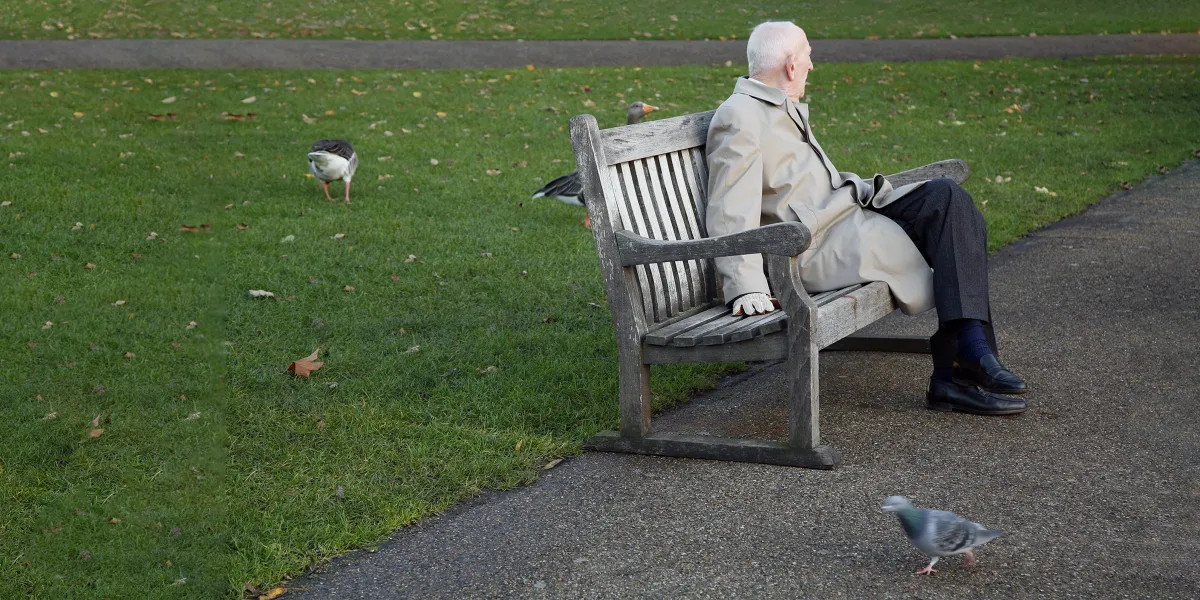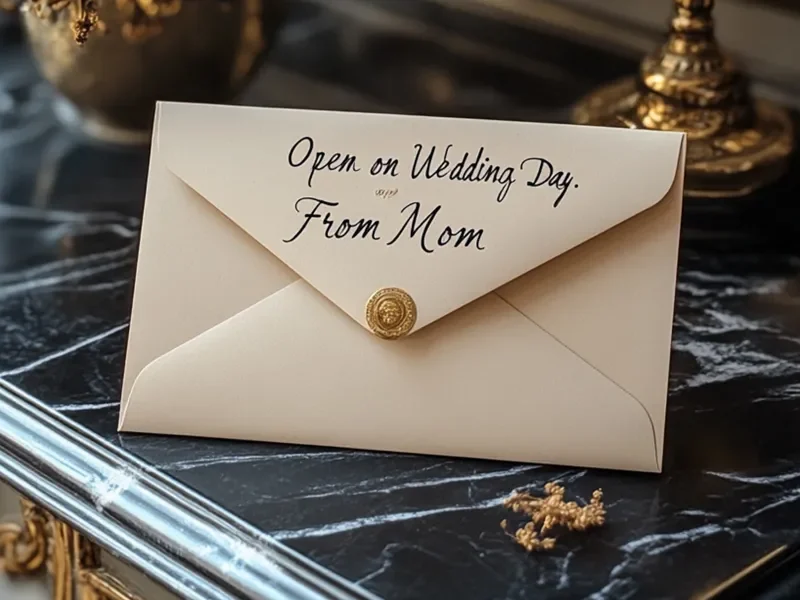Every day, I sat on the same park bench, pretending I was just another old man killing time. But the truth was darker. I was waiting for someone who never came. Until a little girl handed me an old, painfully familiar coat that made my heart nearly stop.
My name is Mr. Whitmore. Seventy-five years behind me, and most days looked exactly the same. Maybe that was why I kept going. Predictability. Order. No surprises.
Every morning, I would boil water, pour it over a small cup of oats, and dice half a carrot into it. Strange, maybe, but it was my way. A carrot gives it a little crunch. Then, I’d have a cup of decaf coffee.
My name is Mr. Whitmore.
Seventy-five years behind me, and most days looked exactly the same.
Afterward, I washed the same chipped bowl, set it back in the cupboard, then wound the clock on the wall.
Tick-tock, tick-tock. Time behaved itself, unlike me when I was younger.
Meanwhile, I would lower myself into my old armchair, put on a record (always Sinatra), and read the morning paper cover to cover. Always the obituaries first.
I guess I wanted to make sure I wasn’t in them.
Tick-tock, tick-tock.
Time behaved itself, unlike me when I was younger.
By ten sharp, I buttoned my worn coat and walked to the park. The geese always met me there, waddling across the grass like they owned it.
“Morning, ladies,” I muttered to them. “Still prettier than I am.”
People in the park knew me, though not well.
“How are you today, Mr. Whitmore?” Mrs. Johnson from across the street would call out, pushing her little dog in a stroller.
People in the park knew me, though not well.
“Still alive, thank you,” I replied with a stiff nod.
Later, an old man with a cane would shout, “How’s the back holding up, Whitmore?”
“Still bent,” I barked. “Appreciate you asking.”
They thought I was just another lonely widower taking in some fresh air. But my bench wasn’t chosen at random. No.
I sat there every day because, long ago, that was where we had sat.
But my bench wasn’t chosen at random. No.
“Clara,” I’d whisper. “You’d laugh at me now, wouldn’t you? Eating carrots with oatmeal. Foolish old man.”
I could almost hear her chuckle, that teasing voice telling me I never knew how to cook.
Sometimes I answered out loud, which earned me a few puzzled looks. But I didn’t care. Talking to Clara was the only part of the day that made sense.
When evening came, I’d come home, open a can of beans, and add a slice of bread.
Talking to Clara was the only part of the day that made sense.
Sometimes, I unwrapped one of those little caramel candies. Clara used to love them. I placed one on her saucer at night, back when we still had laughter in the kitchen. That was a lifetime ago.
So the days passed, one after another. I was waiting for the past to appear again. It had become my ritual. My secret.
And it went on like that for years. Until one rainy morning, when the park was almost empty and the geese huddled by the pond, something happened that broke the pattern. Something I never expected.
Something happened that broke the pattern.
***
That morning, the drizzle started before I even reached the bench. I sat down anyway, stubborn as always.
My old overcoat wasn’t as warm as it used to be. Or maybe it was just my bones, too old to hold out against the chill. I pulled the collar tight and muttered, “We’ve sat here through worse, haven’t we, Clara?”
Suddenly, I heard small footsteps splashing in the wet gravel.
A little girl stopped in front of me. Maybe five years old.
A little girl stopped in front of me.
She was bundled up against the rain: a thick knitted sweater with a wide collar, soft woolen pants, bright red boots, and a matching hat pulled low on her ears.
I stared at the handiwork. Clara used to knit like that. Every loop, every stitch, made with care.
“Oh, there are still people who make things with their hands,” I mumbled.
“Good day, sir,” she said brightly. “I’m Leah.”
I stared at the handiwork.
Clara used to knit like that.
“Hello, Leah. I’m Mr. Whitmore.”
“Aren’t you cold, Mr. Whitmore? Sitting here all alone in the rain?”
I gave a half-grumble. “Old men are used to being cold.”
“Lonely people get chilly quicker when the weather’s bad.”
Before I could answer, she began fumbling with her buttons. In a moment, she tugged off her little jacket and laid it carefully across my knees.
She tugged off her little jacket and laid it carefully across my knees.
“It won’t cover all of you, but it’s better than nothing.”
I stared at her in disbelief. “Leah… thank you. But won’t your mother be upset, seeing you come home without it?”
“I don’t have a mom. My grandma takes care of me. She taught me to always help people.”
“Where is she now?” I asked, glancing around the empty, rain-slick park.
The benches glistened, the trees dripped, and no one else was there.
“I don’t have a mom. My grandma takes care of me.
She taught me to always help people.”
“At home. We live near the park. Well, I’d better go. Goodbye, Mr. Whitmore!”
And before I could say another word, she skipped off toward the gate. I sat frozen, the tiny jacket lying across my lap. Something about it pulled at me. And then I turned the collar over. My breath caught.
Stitched in gold thread, delicate but clear, was a single letter ‘C’ and beside it, a tiny oak leaf.
“No… it can’t be…”
And then I turned the collar over.
My breath caught.
That jacket. My Clara had worn one just like it when we were young, running through autumn puddles, laughing in the wind. She had worn it until the sleeves frayed, swearing it brought her luck.
I pressed the fabric to my chest. “Are you still out there, Clara? Have you been here all this time?”
The drizzle thickened into rain, drumming hard on the benches around me. But I didn’t notice. I had to find that little girl again. I had to know where she got the jacket.
I had to find that little girl again.
I had to know where she got the jacket.
***
The following morning, I woke up before the alarm clock struck seven. For years, my days had unfolded like the same song played on repeat. But not that morning.
Instead of oats with a chopped carrot, I fried two eggs. The smell filled the kitchen, strange and new.
“Well, Clara,” I muttered, poking at the pan, “guess I still remember how to cook something decent.”
I poured a glass of orange juice and raised it toward the empty chair. “Here’s to change, huh?”
For years, my days had unfolded like the same song played on repeat.
But not that morning.
I even whistled while shaving, though I cut myself twice.
“See what you’ve done, Leah? You’ve got me behaving like a fool.”
When I stepped outside, Mrs. Johnson called, as always, from across the street, her dog bundled in the stroller.
“How are you today, Mr. Whitmore?”
I straightened my back a little. “Still alive and even had eggs for breakfast. That’s practically a miracle, don’t you think?”
“See what you’ve done, Leah? You’ve got me behaving like a fool.”
She laughed. “Good for you!”
The man with the cane passed by. “How’s the back holding up, Whitmore?”
“Crooked as ever, but I figure it matches the rest of me.”
He chuckled. “At least you’ve still got your humor.”
“That’s the last thing I plan on losing.”
By ten, I was on my bench. Inside lay the folded coat, the toy duck, and two caramels.
By ten, I was on my bench.
“She’ll come, Clara. You’ll see. She’ll come skipping right up to me.”
But noon came. Then two. By three o’clock, my knees ached, my stomach growled, and still no Leah. Only the geese, strutting smugly.
“Don’t look at me like that,” I scolded them. “I’ve waited longer for worse company.”
I trudged home, setting the untouched bag on the table.
“Where are you, child? Why didn’t you come back?”
By three o’clock, my knees ached, my stomach growled, and still no Leah.
***
Days passed. Still no Leah. Yet I had changed.
At the corner shop, I told the clerk, “Better give me those fresh flowers. Yes, flowers! Don’t look so shocked. Even old men have vases.”
At home, I placed the blooms in Clara’s favourite vase.
“You always liked tulips, didn’t you? Don’t argue, I remember.”
One morning, instead of hiding behind my door, I stepped outside to greet the mailman.
Days passed. Still no Leah.
Yet I had changed.
“Good day to you!”
“Why, good day, Mr. Whitmore. Don’t usually see you out here.”
“New routine. Tell me, you wouldn’t happen to know a little girl named Leah, would you? Lives with her grandmother near the park.”
“Leah, you say? Can’t recall any Leahs in these parts. Been doing this route for twenty years.” My shoulders sank, but he went on. “Though… there is an older lady with a little girl who turned up not long ago. They’re staying at the shelter just past the park.”
“Tell me, you wouldn’t happen to know a little girl named Leah, would you?”
“A shelter? Why would they— Never mind. That’s something.”
“That’s all I know. You might ask there.”
“Thank you. And may your bag never get too heavy.”
The mailman laughed. “I’ll take that blessing!”
Later, I took my bundle with the coat, toy duck, and caramels, and headed to the shelter.
I took my bundle with the coat, toy duck, and caramels, and headed to the shelter.
***
My heart thumped harder with every step as I walked toward the shelter.
“Easy now, Whitmore. She’s just a child. Just give back the coat, ask a question or two, and go.”
But deep down, I knew that wasn’t just about a coat.
Inside, I asked the woman at the desk, “Excuse me. A little girl named Leah, with her grandmother… are they here?”
“Down the hall, second door.”
“Easy now, Whitmore. She’s just a child.
Just give back the coat, ask a question or two, and go.”
I walked slowly. My palms were sweating. I pushed the door open.
Leah leaped up. “Mr. Whitmore!” She ran to me, wrapping her little arms around my waist.
And then I saw her. Sitting by the window, her gray hair tied back, her face lined with years I hadn’t witnessed. My knees nearly gave out.
“Clara…”
And then I saw her.
She turned, froze, then her eyes hardened. “You.”
“Clara, it’s me. I—”
“Don’t you dare. You left me, remember? I was carrying our child, and you vanished. No letter, no call.”
I shook my head wildly. “No! That’s not true. I never—”
“Don’t you dare. You left me, remember?
I was carrying our child, and you vanished. No letter, no call.”
“My mother told me you called,” Clara said bitterly, her hands shaking. “She said you told her you were done with me. That you didn’t want a woman tied down with a baby. Do you know what that did to me?”
“I never called, I swear. I would’ve never said that. Clara, I waited for you every day at that bench. I thought you didn’t want me anymore.”
She looked away, blinking fast.
“My mother told me you called.”
“And while you were waiting, I was losing everything. Our daughter—she grew sick. I spent every coin, every breath, trying to save her. And when she was gone, all I had left was Leah. My granddaughter. So I came back to the city where it all began. To start over, even if it meant this shelter.”
Leah tugged at her sleeve. “Grandma, don’t cry.”
I dropped to my knees, holding the little jacket in my hands.
I dropped to my knees, holding the little jacket in my hands.
“This coat… it was yours. Yours, and now Leah’s. It found me. You found me, Clara.”
“My mother,” Clara whispered. “She drove us apart, and I… I trusted her.”
I reached into the paper bag and pulled out two small caramel candies and placed them in her hand.
“I kept them all these years. Every night I thought of you, Clara. Waiting. Hoping.”
Her fingers closed around the sweets. Tears slid down her cheeks. “You really did wait…”
“You really did wait…”
“Come with me. Both of you. I don’t have much, but I’ve saved enough. Enough for Leah’s schooling, enough for a fresh start.”
Clara looked at Leah, then back at me. Her eyes still glistened with tears.
“Don’t wait anymore, Mister Whitmore,” Leah said, squeezing my hand.
I laughed through my tears. “Yes, Leah. Let’s go home.”
“Let’s go home.”
*** Five Years Later ***
From that moment, the vase on my table was never empty. Fresh flowers brightened the room each week.
I no longer opened the paper to scan the obituaries. Instead, I read stories aloud to Leah, who had grown tall and clever, always correcting my pronunciation with a grin.
Clara hummed in the kitchen, stirring soup, while I worked in the garden, coaxing tomatoes and beans from the soil.
In the evenings, we all sat together, our laughter chasing shadows from the corners of the house.
I had once been an old man on a park bench, waiting for the past. Finally, I was simply a man with a family again.


